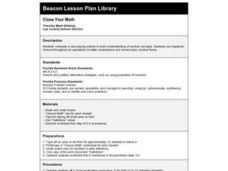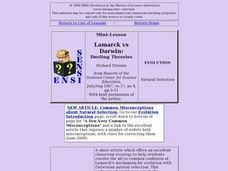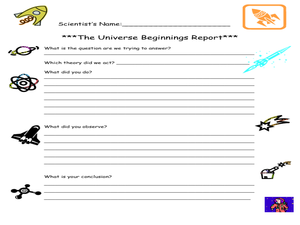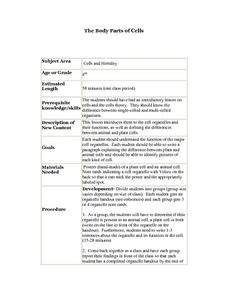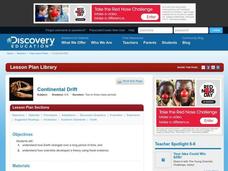Curated OER
Kids for Conservation: Animal Unit
Students discuss animal needs and characteristics. In this animal mini-unit, students complete three activities studying different animals, their needs, how they have evolved, and how to protect them.
Curated OER
Better Traffic Flow
Students calculate the maximum number of cars passing a point in a given amount of time. In this better traffic flow lesson, students work with an existing Excel spreadsheet to solve the traffic flow problem. Students...
John F. Kennedy Presidential Library & Museum
Military Advisers in Vietnam: 1963
How did the beginning of the Vietnam War factor into the Cold War with the Soviet Union? As part of a study of American involvement in Vietnam, class members read a letter address to President Kennedy and his response in which...
University of Georgia
Bag O' Isotopes
Accommodate your chemistry class with an experiment that is both entertaining and educational. Through the activity, blossoming chemists perform calculations on various isotopes, as represented by beans and legumes, to obtain...
Virginia Department of Education
Thermochemistry: Heat and Chemical Changes
What makes particles attract? Here, learners engage in multiple activities that fully describe colligative properties and allow the ability to critically assess the importance of these properties in daily life. Young chemists...
Curated OER
History of Theory of Evolution
Students infer evolutionary relationships by comparing the physiological data or description. They write what they think would happen if a brown bear in the woods had an offspring that was white. Would this help the baby bear in its...
Curated OER
Close Your Math
Fourth graders complete a role playing activity to build understanding of number concepts. They use Algebraic Closure throughout six operations to better comprehend and review basic number theory. They utilize a worksheet imbedded in...
Curated OER
An Introduction to Public Key Cryptography
Students secure information online using cryptography. In this algebra lesson, students use RSA technology to encrypt information on the internet. They use modular reduction of natural numbers to understand prime number theory.
NASA
Melting Ice: Designing an Experiment
Sometimes, despite the best laid plans, the unexpected will occur. Learners witness this firsthand as they carefully design an experiment to determine the time needed for ice to melt in salt water or pure water. They uncover facts not...
ReadWriteThink
Critical Media Literacy: Commercial Advertising
Commercial advertising—we can't get away from it, but do we realize just how often we are being advertised to? With this instructional activity, scholars analyze mass media to identify how its techniques influence our daily lives....
Curated OER
Lamarck vs Darwin: Dueling Theories
Students, in groups, study cheetah, blind cave organisms, and naked mole rats to explain facets of evolution.
Curated OER
Range, Cluster, Gap and Outliers
There are a number of activities here where learners collect and record data, as well as, activities where the likelihood of an event happening is calculated given the experimental probability. Young statisticians organize information...
Roald Dahl
The Twits - The Twits Get the Shrinks
Turn readers into investigative journalists. The 11th and final lesson that accompanies The Twits by Roald Dahl asks the question "What happened to Mr. and Mrs. Twit?" The lesson uses mind maps and group discussion to help answer...
Curated OER
Space: The Universe As We Know It!
Students simulate the Big Bang. In this lesson on the origin of our universe, students role play to show how the Big Bang explosion may have created our universe.
Curated OER
The Body Part of Cells
Eighth graders are introduced to cell organelles and their functions and the they define the differences between animal and plant cells. They write a paragraph explaining the difference between plant and animal cells and students...
Curated OER
The Arthropod Story
Learners learn a number of evolutionary concepts by following the long history of the arthropods and have opportunities to think about arthropod evolution in terms of both opportunities and constraints.
Curated OER
How Evolution Works
Students work in groups to investigate and present genetic variation, adaptation, and sexual selection as it relates to evolution. For this evolution lesson, students watch a video discuss how the human eye could evolve due to natural...
Curated OER
Classification and Binomial Nomenclature
Students practice identifying different groups of living organisms using a dichotomous key. Students also examine the history of an organism and its lineage by writing a paragraph about it and "three generations" of ancestors.
Curated OER
The Photoelectric Effect in Photocells
Illuminate your physics class with this examination of a photovoltaic cell. Teach the structure and operation of the device using a diagram. Then make a human-powered, larger-than-life sized model of a PV cell. Learners become electrons...
Field Museum
The Case of Darwin's Finches
One of the most striking pieces of evidence for Darwin's Evolution of Species was his observations of finches and how their beaks differed from island to island, depending on their primary food sources. So what would happen to the theory...
Saint Louis Zoo
Introduction to Natural Selection: Darwin & Lamarck
Charles Darwin and Jean Baptiste Lamarck are credited for developing the theory of natural selection. After teaching your beginning biologists about acquired characteristics, they read the included selection and answer questions that...
Curated OER
Moral Development in Camus' The Stranger
“In the depth of winter, I finally learned that within me there lay an invincible summer.” Readers of The Stranger rate Mersault’s moral development (or lack thereof) using Kohlberg’s Theory of Moral Development scale. Using...
Curated OER
Continental Drift
Be sure to come prepared to discuss the theory of Pangaea and the two super-continents, Laurasia and Gondwanaland. Collaborative learners look for fossil evidence that supports the theory that one super-continent divided into two. They...
Colorado State University
What Is a "Model"?
Model the transfer of energy during a typical 24-hour period. Young scholars use a game-like approach to learning the patterns of heat transfer through the day and night. Groups of four exchange different tokens as the energy...
Other popular searches
- Math Number Theory
- Number Theory and Operations
- Number Theory 1
- Number Theory Rounding
- Number Theory Ed Helper
- Number Theory Ii
- Number Theory Edhelper
- Number Theory Concepts
- Number Theory Lesson Plans
- Math + Number Theory
- Egypt Math Number Theory
- Color Tiles Number Theory








